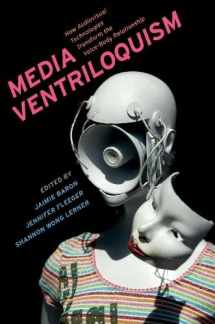
Media Ventriloquism: How Audiovisual Technologies Transform the Voice-Body Relationship
Book details
Summary
Description
The word "ventriloquism" has traditionally referred to the act of throwing one's voice into an object that appears to speak. Media Ventriloquism repurposes the term to reflect our complex vocal relationship with media technologies. The 21st century has offered an array of technological means
to separate voice from body, practices which have been used for good and ill. We currently zoom about the internet, in conversations full of audio glitches, using tools that make it possible to live life at a distance. Yet at the same time, these technologies subject us to the potential for
audiovisual manipulation. But this voice/body split is not new. Radio, cinema, television, video games, digital technologies, and other media have each fundamentally transformed the relationship between voice and body in myriad and often unexpected ways. This book explores some of these experiences
of ventriloquism and considers the political and ethical implications of separating bodies from voices. The essays in the collection, which represent a variety of academic disciplines, demonstrate not only how particular bodies and voices have been (mis)represented through media ventriloquism, but
also how marginalized groups - racialized, gendered, and queered, among them - have used media ventriloquism to claim their agency and power.


We would LOVE it if you could help us and other readers by reviewing the book
Book review



